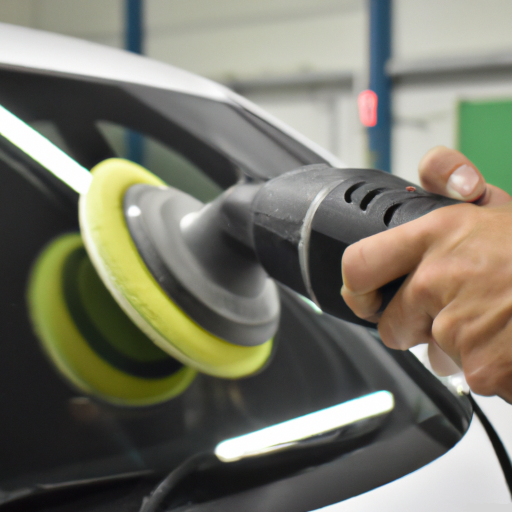


In the automotive world, the concept of "Car Tuning and Body Repair" is a symphony of precision engineering and aesthetic mastery. Whether you're seeking enhanced performance, a personalized touch, or the restoration of a vehicle's former glory, tuning and body repair are the artisans' tools that transform your car into a bespoke masterpiece. Join us on a journey into the realms of horsepower upgrades, aesthetic refinements, and the meticulous artistry of body repair.
The Symphony of Car Tuning: Unleashing the Power Within
Car tuning is the alchemy that elevates a vehicle from its factory configuration to a bespoke powerhouse. At the heart of tuning lies the quest for optimized performance—more horsepower, improved fuel efficiency, and a driving experience that transcends the ordinary. The tuning process involves recalibrating the engine control unit (ECU), upgrading or replacing components like air intakes, exhaust systems, and turbochargers, and fine-tuning parameters to achieve the perfect balance of power and efficiency.
Powertrain Precision: Enhancing Performance
Car tuning often starts with the powertrain—the engine and transmission duo that propels your vehicle. Engine remapping, or chipping, is a common practice where the ECU's software is recalibrated to optimize fuel injection, ignition timing, and other performance parameters. Upgrading components such as cold air intakes, high-flow exhaust systems, and performance chips can further enhance horsepower and torque, transforming your car into a dynamic powerhouse.
Suspension Symphony: Achieving the Perfect Ride
A well-tuned suspension system is the conductor of a smooth and responsive driving experience. Coilovers, sway bars, and performance shocks are among the components that can be upgraded to improve handling, reduce body roll, and provide a sportier ride. Adjusting ride height and aligning the suspension components contribute to achieving the perfect balance between comfort and performance, creating a symphony of harmony on the road.
Braking Ballet: Ensuring Control and Safety
Car tuning extends to the braking system, a crucial aspect of both performance and safety. Upgrading brake pads, rotors, and calipers can enhance stopping power and reduce brake fade during intense driving conditions. Performance brake kits and high-friction materials contribute to the ballet of controlled deceleration, providing drivers with the confidence to push their vehicles to the limit.
Aesthetic Refinement: The Art of Body Tuning
Beyond the mechanical intricacies, car tuning embraces the realm of aesthetic refinement. Body tuning involves enhancing the visual appeal of a vehicle through modifications like custom paint jobs, body kits, and aerodynamic enhancements. From sleek spoilers to aggressive bumpers, these visual upgrades not only make a statement but can also improve aerodynamics and overall performance.
Restoring Beauty and Functionality.
While tuning explores the realm of performance enhancement, body repair is the art of restoration—a meticulous dance that mends the scars of time, accidents, and wear. Body repair encompasses a spectrum of services, from dent removal and paint correction to major collision repairs. Here's a closer look at the intricacies of this precision dance:
Dent and Scratch Elegance: Erasing Imperfections
Every scratch and dent tells a story, but not all stories need to be permanent. Paintless dent repair (PDR) is a technique that delicately massages dents from the inside, preserving the original paint finish. For scratches and paint imperfections, detailing and paint correction techniques bring back the luster, providing a flawless canvas for your car's aesthetic expression.
Collision Choreography: Restoring Structural Integrity
In the unfortunate event of a collision, body repair takes on a more complex choreography. Frame straightening, panel replacement, and structural repairs are essential to restore the vehicle's structural integrity. Advanced technologies such as computerized measuring systems and laser-guided frame straightening ensure precision in every adjustment, bringing the vehicle back to its factory specifications.
Paint Elegance: A Flawless Finish
A flawless paint finish is the crowning jewel of any vehicle, and body repair includes techniques to ensure a seamless and durable coat. From color matching to blending and clear coat application, the painting process is a meticulous craft that demands expertise and attention to detail. Modern paint booths and advanced paint technologies contribute to achieving a factory-quality finish.
Interior Refinement: Beyond the Surface
Body repair extends beyond the exterior, encompassing the interior of the vehicle as well. Whether it's repairing upholstery, replacing damaged trim, or addressing electronic components affected by a collision, the interior refinement aspect of body repair ensures that the beauty and functionality of your vehicle are restored comprehensively.
Car tuning can have both positive and negative effects, depending on the specific modifications and the intended use of the vehicle. Here are some reasons why car tuning can be good and why it can also have downsides:
Why car tuning is good:
Improved Performance: Car tuning can improve the performance of a vehicle in various ways such as increasing horsepower, torque, and acceleration, improving braking and handling, and reducing weight.
Customization: Tuning allows for customization, allowing the owner to personalize their vehicle to their taste and preferences.
Aesthetic Enhancements: Some tuning modifications can enhance the appearance of a vehicle such as changing the wheels, adding spoilers, and upgrading the interior.
Better Fuel Efficiency: Tuning can also improve fuel efficiency by optimizing the engine's performance and reducing drag on the vehicle.
Why car tuning is not always good:
Safety: Modifications that alter the safety systems of a car, such as disabling airbags or modifying the brakes, can make the car less safe to operate.
Legal Issues: Some tuning modifications may not be legal, especially if they violate emissions standards or safety regulations. Illegal modifications can result in fines, impounding of the vehicle, or even criminal charges.
Warranty Voiding: In some cases, car tuning may void the manufacturer's warranty, leaving the owner liable for any repairs needed on the vehicle.
Decreased Reliability: Modifying a car can sometimes lead to decreased reliability, especially if the modifications are not performed correctly or the vehicle is pushed beyond its limits.
Car tuning can be beneficial if done correctly and with consideration of safety and legal requirements. However, it can also have downsides if not performed correctly, leading to decreased safety, reliability, and potential legal issues. It's essential to research and understands the implications of any tuning modifications before making them.
Car tuning is the process of making modifications to a vehicle to improve its performance, handling, and/or appearance. Tuning can involve a variety of modifications, such as upgrading the engine, suspension, brakes, exhaust, and aerodynamics.
There are several types of car tuning:
Performance tuning: This type of tuning focuses on improving the engine's power and torque output. It can involve upgrading the engine's intake and exhaust systems, adding a turbocharger or supercharger, and modifying the engine's computer software to increase performance.
Suspension tuning: This type of tuning focuses on improving the handling and ride quality of the vehicle. It can involve upgrading the suspension components, such as the shocks, struts, springs, and sway bars, to improve the vehicle's handling and stability.
Brake tuning: This type of tuning focuses on improving the vehicle's braking performance. It can involve upgrading the brake components, such as the brake pads, rotors, and calipers, to improve the vehicle's stopping power and reduce brake fade.
Appearance tuning: This type of tuning focuses on improving the vehicle's visual appeal. It can involve modifying the vehicle's body kit, adding custom wheels and tires, and installing a new paint job or vinyl wrap.
Car tuning can be done by DIY enthusiasts or professional tuners. However, it is important to note that some tuning modifications can affect the vehicle's warranty, emissions compliance, and safety. Therefore, it is important to research and carefully consider the modifications before making any changes to your vehicle.
Car tuning can be a fun and rewarding process that can improve your driving experience and make your vehicle stand out from the crowd.
Before starting a car tuning project, it's important to consider the following factors:
Research and plan: It's important to research and plan your car tuning project thoroughly. This includes identifying the modifications you want to make and the potential costs and benefits of each modification. You should also consider your budget and timeline for the project.
Consider your goals: Think about what you want to achieve with your car tuning project. Are you looking to improve performance, appearance, or both? Identifying your goals will help you choose the right modifications for your vehicle.
Consider the impact on your warranty: Some car tuning modifications can void your vehicle's warranty, so it's important to check with your manufacturer before making any changes. Additionally, some modifications can affect your vehicle's emissions compliance, so it's important to research the regulations in your area.
Choose the right parts and components: When choosing parts and components for your car tuning project, it's important to choose high-quality, reputable brands. This will ensure that the parts and components are durable, reliable, and safe.
Consider professional help: While DIY car tuning can be a fun and rewarding project, some modifications are best left to professionals. For example, engine modifications can be complex and require specialized knowledge and tools. Consider consulting with a professional tuner or mechanic to ensure that your modifications are done safely and correctly.
Stay within legal limits: When making modifications to your vehicle, it's important to stay within legal limits. This includes adhering to local emissions regulations and avoiding modifications that make your vehicle unsafe or illegal on public roads.
Choosing the right car tuning company or workshop is important to ensure that your vehicle is modified safely and effectively. Here are some tips to help you choose a reputable car tuning company or workshop:
Research and check reviews: Start by researching car-tuning companies or workshops in your area. Look for reviews and testimonials from past customers to get an idea of the company's reputation and quality of work.
Check for certification: Look for a car tuning company or workshop that is certified or accredited by reputable organizations, such as the National Institute for Automotive Service Excellence (ASE) or the Specialty Equipment Market Association (SEMA).
Check for experience and expertise: Look for a car tuning company or workshop with experience and expertise in the specific modifications you are looking for. Ask about the company's track record and success with similar projects.
Ask for references: Ask the company or workshop for references from past customers. Contact these references to ask about their experience with the company or workshop and the quality of work they received.
Check for insurance and warranties: Look for a car tuning company or workshop that has liability insurance and offers warranties or guarantees on their work. This will protect you in case of any damage or issues with the modifications.
Consider the cost: While cost should not be the only factor in your decision, it is important to consider the pricing of the car tuning company or workshop. Make sure to get a detailed quote for the work before agreeing to anything.

Body repair work is a type of automotive repair that focuses on repairing or replacing damaged body panels, frames, and other exterior components of a vehicle. Here are some common types of body repair work:
Paint repair: This type of repair focuses on restoring the vehicle's paint job. It can include fixing scratches, dents, or rust spots, and repainting the affected area to match the rest of the vehicle.
Dent repair: Dent repair involves removing dents and creases from the body of the vehicle. It can be done using specialized tools or techniques, such as paintless dent repair, which removes dents without damaging the vehicle's paint.
Collision repair: Collision repair involves repairing or replacing damaged body panels and frames due to a collision. This can include straightening the frame, repairing or replacing damaged panels, and restoring the vehicle's alignment.
Rust repair: Rust repair involves removing rust and repairing or replacing affected body panels. It's important to address rust as soon as possible to prevent it from spreading and causing further damage to the vehicle.
Body kit installation: Body kit installation involves adding aftermarket body panels, spoilers, and other exterior components to a vehicle to improve its appearance and performance.
Body repair work can be complex and requires specialized knowledge and tools. It's important to choose a reputable body repair shop with experience and expertise in the specific type of repair you need. By doing so, you can ensure that your vehicle is repaired safely and effectively and that it looks and performs its best.
Car body repair work involves several aspects to ensure that the repair is done correctly and to a high standard. Here are some of the key aspects involved in car body repair work:
Damage assessment: Before any repair work can be done, it's important to assess the extent of the damage to the vehicle. This can involve a visual inspection, as well as diagnostic tests and measurements to determine the exact nature and scope of the damage.
Safety considerations: Safety is a top priority in car body repair work. It's important to ensure that the vehicle is structurally sound and that any repairs are done in a way that does not compromise the safety of the vehicle or its occupants.
Parts selection: Choosing the right parts for the repair is crucial to ensure that the repair is effective and that the vehicle is restored to its pre-accident condition. This may involve selecting OEM (original equipment manufacturer) parts or aftermarket parts, depending on the specific repair.
Repair techniques: There are several techniques used in car body repair work, including welding, bonding, and riveting. The right technique will depend on the type and extent of the damage, as well as the type of material being repaired.
Paint matching: If the repair involves repainting the vehicle, it's important to ensure that the new paint matches the existing paint as closely as possible. This may involve custom-mixing paint or using computerized paint-matching technology.
Quality control: Once the repair is complete, it's important to conduct thorough quality control checks to ensure that the repair is of a high standard and that the vehicle is safe to drive.
Car tuning and body repair, while distinct in their objectives, share a common goal—to elevate a vehicle to its peak potential, marrying performance with aesthetics. In the hands of skilled artisans, these practices converge to craft automotive masterpieces that transcend the ordinary. Whether you seek the thrill of enhanced horsepower or the restoration of a beloved classic, the precision dance of tuning and repair transforms your car into a unique expression of craftsmanship and passion. So, whether you're chasing speed, turning heads, or restoring a piece of automotive history, the symphony of car tuning and body repair awaits, ready to craft a bespoke automotive masterpiece just for you.
Have a good tuning,

We use cookies
We use cookies and other tracking technologies to improve your browsing experience on our website, to show you personalized content and targeted ads, to analyze our website traffic, and to understand where our visitors are coming from. Privacy Policy.